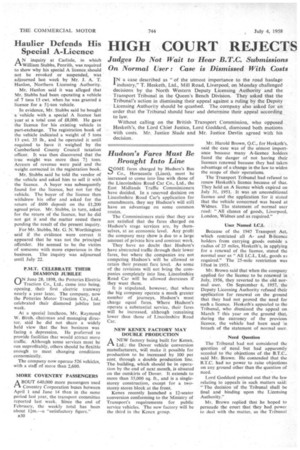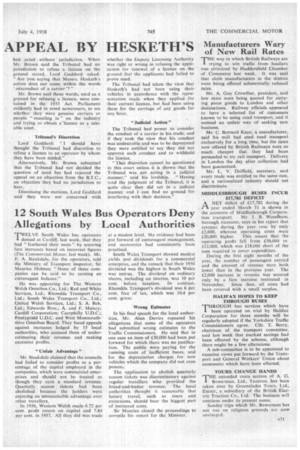HIGH COURT REJECTS APPEAL BY
Page 40

Page 41

If you've noticed an error in this article please click here to report it so we can fix it.
HESKET1-15S
Judges Do Not Wait to Hear B.T.C. Submissions On Normal User : Case is Dismissed With Costs
IN a case described as "of the utmost importance to the road haulage I industry," T. Hesketh, Ltd., Mill Road, Liverpool, on Monday challenged decisions by the North Western Deputy Licensing Authority and the Transport Tribunal in the Queen's Bench Division. They asked that the Tribunal's action in dismissing their appeal against a ruling by the Deputy Licensing Authority should be quashed. The company also asked for an order that the Tribunal should hear and determine their appeal according to law.
Without calling on the British Transport Commission, who opposed Hesketh's, the Lord Chief Justice, Lord Goddard, dismissed both motions with costs. Mr. Justice Slade and Mr. Justice Devlin agreed with his decision.
Mr. Harold Brown, O.C., for Hesketh's, said the case was of the utmost importance because many A-licence holders faced the danger of not having their licences renewed because they had taken advantage of a change in the law to widen the scope of their operations.
The Transport Tribunal had refused to renew Hesketh's licence because of that. They held an A licence which expired on July 31, 1951. It was an unconditional licence and the application for it stated that the vehicle concerned was based at Widnes. The statement of normal user read: "All classes of goods, Liverpool, London, Widnes and as required."
User Named IC3..
Because of the 1947 Transport Act, which restricted all Aand B-licence holders from carrying goods outside a radius of 25 miles, Hesketh's, in applying for a renewal of the licence, stated the normal user as "All I.C.I., Ltd., goods as required." The 25-mile restriction was lifted in 1953.
Mr. Brown said that when the company applied for the licence to be renewed in July, 1956, they reverted to the old normal user. On September 6, 1957, the Deputy Licensing Authority refused their application for renewal on the ground that they had not proved the need for such a licence. Hesketh's appealed to the Tribunal, who dismissed the appeal on March 7 this year on the ground that, during the currency of the previous licence, the vehicle had been used in breach of the statement of normal user.
Need Question The Tribunal had not considered the question of need but had apparently acceded to the objections of the B.T.C., said Mr. Brown. He contended that the B.T.C. had no power to raise objections on any ground other than the question of need.
Lord Goddard pointed out that the law relating to appeals in such matters said: "The decision of the Tribunal shall be final and binding upon the Licensing Authority."
Mr. Brown replied that he hoped to persuade the court that they had power to deal with the matter, as the Tribunal had acted without jurisdiction. When Mr. Brown said the Tribunal bad no jurisdiction to refuse a licence on the ground stated, Lord Goddard asked: "Are you saying that Messrs. Hesketlfs action does not come within the words ' misconduct of a carrier '? "
Mr. Brown said those words, used as a ground for refusing a licence, were contained in the 1933 Act. Parliament evidently had in mind newcomers, to see whether they were genuine carriers or people 'muscling in" on the industry and trying to obtain a "licence as a saleable asset.
Tribunal's Discretion Lord Goddard: `,` I should have thought the Tribunal had discretion to refuse a licence to an operator by whom they have been misled."
Alternatively, Mr. Brown submitted that the Tribunal had not decided the question of need but had rejected the appeal on an objection from the B.T.C., an objection they had no jurisdiction to hear.
Dismissing the motions, Lord Goddard said they were not concerned with whether the Deputy Licensing Authority was right or wrong in refusing the application for renewal of a licence on the ground that the applicants had failed to prove need.
The Tribunal had taken the view that Hesketh's had not been using their vehicles in accordance with the representation made when they applied for their current licence, but had been using them for the carriage of any goods for any hirer.
"Judicial Action" The Tribunal had power to consider the conduct of a carrier in his trade, and if they took the view that his conduct was undesirable and was to be deprecated they were entitled to say they did not approve such conduct and to withhold the licence.
"That discretion cannot be questioned in this court unless it is shown that the Tribunal was not acting in a judicial manner," said his lordship. " Having read the judgment of the Tribunal, it is quite clear they did act in a judicial manner and I can find no ground for interfering with their decision."




























































































































